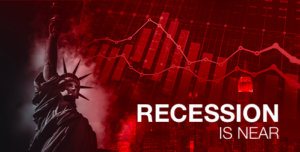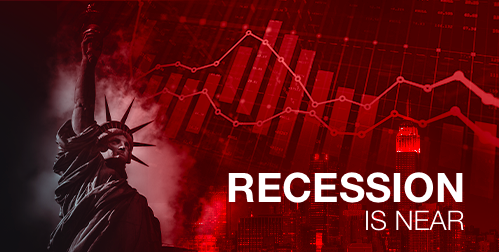- Major banks and economists now say chances of a recession have significantly increased
- A recession is marked by a decline in employment, income, sales, and GDP
- Jobs, investments, and manufacturing are all put at risk during a recession
Recession Much More Likely According to Major Banks
Goldman Sachs says the risk of the US falling into recession within a year has doubled after the Fed’s aggressive rate hike. They think that the risk has jumped to 30% from 15%. When considering the likelihood of recession over the next two years, that risk jumps to almost 50%.1
The Fed just raised rates 75-basis-points. The increase was the biggest rate hike in borrowing costs since 1994. The Federal Reserve is responding to inflation hitting a 41-year high of 8.6% in May.2
The stock market is reacting negatively to the rate hikes. Stocks are falling and bond yields are rising. They are now seen as a drag on economic growth.
Nomura, a leading Japanese investment bank, also predicted a recession. It said the slowdown would be shallow but lengthy. That’s because the Fed and government are highly unlikely to step in with any stimulus.
Morgan Stanley sees the chance of recession at 35% over the next year, up from 20% previously. Morgan Stanley said US stocks could crash another 20% as recession risks increase. Meaning the S&P 500 would drop to 3,000. The index has already dropped 20% from its recent high in early January.3

What is a Recession?
The general definition of a recession is two straight quarters of declines in real gross domestic product. The official declaration that we are in a recession comes from the National Bureau of Economic Research, a private organization of economists. NBER usually declares a recession from 6 to 18 months after the recession’s start. They declare a recession based on certain indicators. The indicators include – lower employment, a drop in personal income, a drop in manufacturing, lower retail sales, and a drop in monthly GDP.
What to Expect During a Recession
Recessions are painful. People lose jobs, can’t pay bills and some lose their homes. There is less money for luxuries. People forego vacations or nights out. There is also less money for essentials like food and medical care.
Jobs: During a recession, jobs disappear. Unemployment levels rise. It becomes harder to find a job since more people are out of work. The biggest losses are in manufacturing and related industries. Sectors that rely on discretionary spending, like leisure, hospitality, and retail, will all lose jobs. Financial industries will shrink as well because businesses and individuals borrow less. Those who keep their jobs can expect to not get a raise or bonus. Hours and wages may be reduced. Even worse, if you can’t pay your bills due to job loss, you may face the prospect of losing your home and other property.
Stock: Stocks generally tank during a recession. The stock market begins to fall from its peak months before the actual recession starts. Investors usually move from riskier securities and into safer investments like precious metals. Retirement plans get upset as the value of stock portfolios drop.
Savings: People who still have jobs tend to spend less and save more. But this can create the “paradox of thrift.” One person’s spending is another person’s income. So, if too many people spend less, the result is a negative spiral. Incomes become progressively lower, and unemployment gets higher.4
Manufacturing and Services: These areas decline during a recession. As costs rise and demand drops, industries cut back production and services.
Liquidity: Banks are less likely to lend in recessions. They fear they are not going to get repaid.
Deficits: Deficits usually increase. Governments often increase spending to offset the recession’s effects. At the same time, tax receipts falls as corporate and personal incomes decline.
The only upside is that recessions don’t last forever. The NBER tracks the average length of U.S. recessions. According to NBER data, from 1945 to 2009, the average recession lasted 11 months. This is an improvement over earlier eras: From 1854 to 1919, the average recession lasted 21.6 months. Knowing that a recession is likely gives you the opportunity to prepare for it. Contact American Hartford Gold to see how a Gold IRA can secure your nest egg during an economic downturn.5

